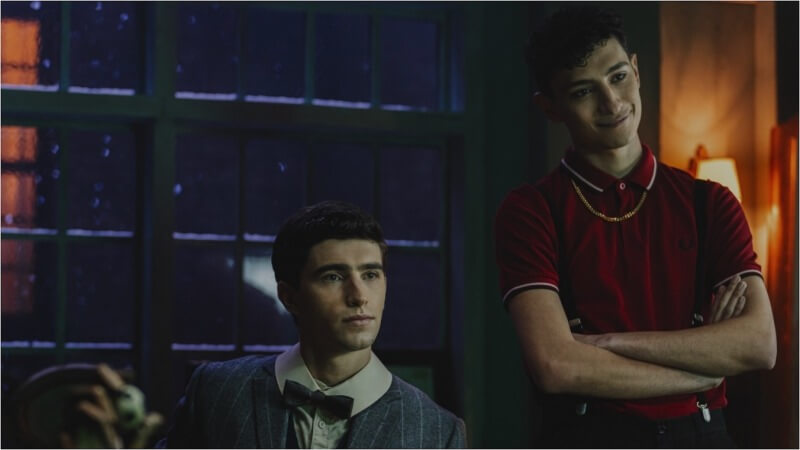It Still Stings: The Swift Cancellation of Netflix’s Dead Boy Detectives
(Photo: Netflix)
Editor’s Note: TV moves on, but we haven’t. In our feature series It Still Stings, we relive emotional TV moments that we just can’t get over. You know the ones, where months, years, or even decades later, it still provokes a reaction? We’re here for you. We rant because we love. Or, once loved. And obviously, when discussing finales in particular, there will be spoilers:

The world of The Sandman is a limitless playground, a universe full of so many intriguing possibilities that around every corner lies a new adventure. For a brief moment in 2024, we were lucky to experience one of those adventures in the form of Netflix’s Dead Boy Detectives, a coming-of-age series merging elements of comedy, fantasy, horror, and mystery. The not-quite-a-spinoff follows two ghosts: the prim Edwin Payne (George Rexstrew), who spent years being tortured in hell and still carries the emotional scars, and his strong and confident best friend, Charles Rowland (Jayden Revri). The two teens have shunned the afterlife to spend their days on Earth helping other ghosts by solving their supernatural maladies. The resulting series is a warm and emotionally fulfilling story about found family, self-discovery, and finding light in life’s darkness. Never afraid of being too weird, the show is as entertaining as they come. But just as quickly as it appeared in our lives, the show was ripped away by the cruel hands of fate, and its cancellation still hurts nearly a year later.
Developed by The Flight Attendant’s Steve Yockey, Dead Boy Detectives was initially created for HBO Max, intended to tie into the platform’s DC Comics superhero series Doom Patrol. However, once James Gunn took control of all things DC for Warner Bros. Discovery, the series no longer fit the company’s creative plans and it was sold to Netflix, where it was set within the extended world of The Sandman (a pragmatic choice given Charles and Edwin were introduced during the Season of Mists storyline in the popular comics). Last-minute changes were made to connect the two shows, with Death (Kirby) and Despair (Donna Preston) both making appearances. But while The Sandman is narratively dense and can feel inaccessible to those without knowledge of its source material, Dead Boy Detectives rarely feels this way, and the primary reason for this is that it uses elements of the supernatural to tell universally understood stories through a case-of-the-week format.
Each episode features a unique mystery, whether it’s ghosts stuck in a time loop, a sea monster calling people to their deaths, or a young woman (Yuyu Kitamura’s Niko, a true delight) playing host to the hilarious but deadly creatures known as dandelion sprites. With the help of Crystal Palace (Kassius Nelson), a teenage psychic who has lost her memories after being possessed by a demon, the boys solve the unsolvable. Overarching storylines involving an immortal witch (Jenn Lyon) with a vendetta, a frisky Cat King (Lukas Gage) who takes an interest in Edwin, and a night nurse (Ruth Connell) tasked with locating spirits who should be in the afterlife are seamlessly woven in and propel the series forward as the boys and Crystal close cases each week. But it’s the emotional arcs of its two leads, including Edwin’s journey of self-acceptance as he slowly comes to understand he’s not only allowed to have feelings for the same sex but that he’s also in love with his best friend, that ultimately gives the show its beating heart.
The easy friendship between Edwin and Charles was formed over many decades after the former comforted the latter as he was dying from hypothermia at the same boarding school where Edwin had been an accidental ritual sacrifice many years earlier. Their relationship is the unshakable foundation of Dead Boy Detectives, and its strength is routinely on display, most notably when Charles travels to hell to rescue Edwin in the series’ penultimate episode. Regardless of whether or not Charles eventually reciprocates Edwin’s professed romantic feelings—the series leaves open the possibility rather than shutting it down completely as lesser shows would—the series is undeniably a heartfelt love story. And it’s better and stronger for embracing it; without their connection to act as a solid base upon which to build, the series would likely fall apart under the sheer weight of its own ambition.
Because the show is ambitious. It seamlessly balances multiple genres without missing a step. It’s as funny as it is campy as it is hauntingly beautiful. In many ways, the show feels like a relic of a different time, like it was forged in the depths of The CW during the network’s heyday when it took storytelling risks no other network dared and was home to groundbreaking shows that centered the stories of young people. This makes sense when you consider the show’s creative team; both Yockey and executive producer Jeremy Carver worked on the long-running Supernatural, while co-showrunner Beth Schwartz spent years on the game-changing superhero show Arrow. Meanwhile, series executive producers Greg Berlanti and Sarah Schecter had their hands in too many CW shows to count. All this experience behind the scenes means the powers that be knew what made good television, and they understood how to build a show to last.
-

-

-

-

-

-

-

-

-

-

-

-

-

-

-

-

-

-

-

-

-

-

-

-

-

-

-

-

-

-

-

-

-

-

-

-

-

-

-

-








































